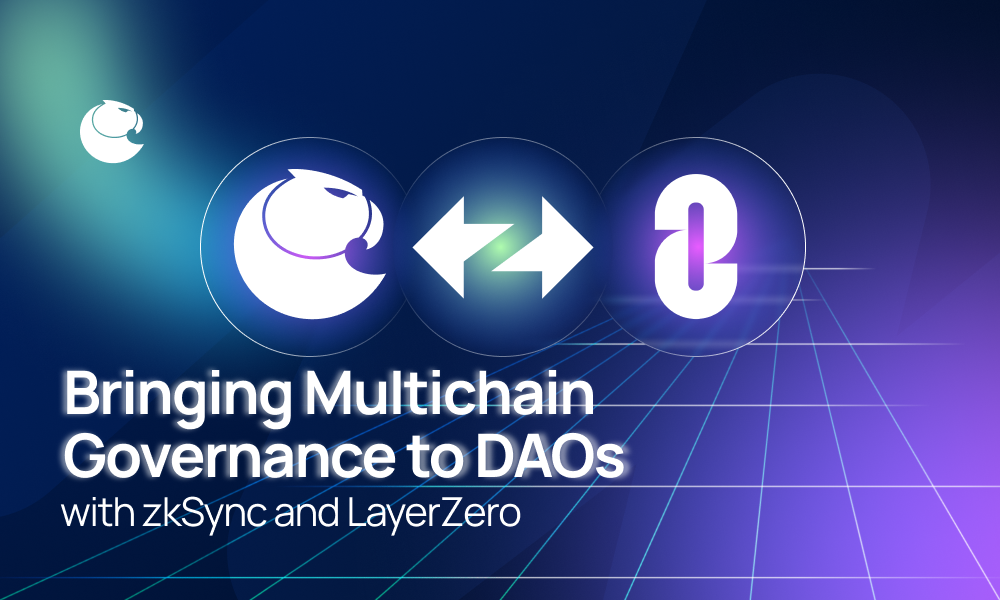Bringing Multichain Governance to DAOs with zkSync and LayerZero
We’re integrating with zkSync and LayerZero to enable governance of assets and permissions across chains from one mainnet DAO.
Aragon

Multichain governance has arrived on Aragon OSx! The new plugin leverages the LayerZero protocol for cross-chain messaging and the zkSync Era rollup for low-cost and secure voting. The code is still undergoing audits but you can already explore it here.
This plugin enables DAOs to govern assets and permissions across EVM chains from one mainnet DAO smart contract. This is a major step forward for the governance of protocols deployed across chains.
Here’s how governance in multichain DAOs will work from proposal to execution:
- Create a custom census with tokens across chains: Create a custom census using governance tokens across multiple chains using LayerZero’s Omnichain Fungible Token (OFT) standard.
- Cast low-cost votes on zkSync: Once the census has been created, members will be able to vote settling on zkSync at a fraction of the cost.
- Execute the action across chains simultaneously: After the vote, users can utilize the Aragon OSx permission management system to execute the action programmed into the proposal on multiple chains simultaneously from your mainnet DAO.
The architecture is diagrammed here:
The plugin code is open-source and currently being audited. If you’re interested in using this design, inquire here about a custom build. The plugin will launch on the no-code Aragon App in the new year.
This specific multichain governance design would not be possible without Aragon OSx’s modular permission management system, making it simple to grant and revoke permissions to external contracts from a DAO contract.
Here’s what you can do with the plugin and why it’s exciting for the future of onchain governance.

What can you do with the multichain
governace plugin?
Execute actions on any chain simultaneously
You can execute actions not just on mainnet, but on any chain that the main DAO has a proxy DAO deployed on. This gives you ultimate governance flexibility to adjust parameters and send assets on the precise chain you need to.
If you want to execute multiple actions simultaneously, you don’t have to create multiple proposals to execute the actions. You can execute all the actions from a single proposal, saving your DAO time and resources. This is thanks to the permission management system at the center of Aragon OSx.
Build a census with tokens from any chain
With the multichain governance plugin, voting rights are no longer fragmented. DAO members can hold governance tokens across any EVM chain and they can be counted in the same voting census on zkSync.
The plugin leverages LayerZero’s Omnichain Fungible Token Standard (OFT) to extend the capabilities of governance tokens, enabling token holders to cast votes on zkSync, no matter which chain their token originated on.
You’re not limited to only fungible tokens, either. You can also use different tokens in your voting census, such as NFTs. This gives you more membership optionality, because your members can hold different tokens on different chains and still have them counted toward their voting power. As long as the tokens follow the Votes Standard, they can be used in the wrapper.
Vote on zkSync to save gas costs and increase token participation
With this plugin, you can save DAO members from having to cast expensive mainnet votes. All votes are cast on zkSync, so they’re just a fraction of the cost of what voting on mainnet would be.
This saves token holders significant gas costs when they vote. It can also increase token participation, because members might be more likely to cast votes if they don’t have to pay for them. Higher token participation can improve a DAO’s capture resistance, because it’s harder for a single entity to buy up the token and unilaterally pass proposals.
Have the advantages of security and liquidity on Layer 1, while increasing voter participation with Layer 2 scalability
Multichain governance gives you the best of Layer 1 and Layer 2 blockchains. Your DAO will have the security and liquidity benefits of being deployed on Ethereum mainnet, with the scalability of voting for a low cost on a Layer 2.
“It's clear now that ethereum is scaling through rollups, but we've left behind the piece about connecting and managing accounts across them. By working on multichain governance, we're enabling Ethereum to scale by helping distribute liquidity and offloading some transactions to L2s, while protocols will still be able to live on mainnet.”
— Carlos, CTO

Technology from industry leaders zkSync and LayerZero make multichain governance possible
We’re proud to integrate with zkSync and LayerZero to make multichain governance a reality. Here’s how it all fits together:
zkSync: the future-proof zkEVM on the mission to scale freedom for all
All votes in the new multichain governance plugin will be conducted on zkSync, a rollup leveraging zero-knowledge proofs.
zkSync is both hyperscalable, being the L2 with the highest total number of transactions, and secure, as it inherits 100% of Ethereum’s security. zkSync’s low-cost transactions and emphasis on security make it an ideal place to conduct your DAO’s votes.
zkSync’s technology also supports paymasters, making it possible for DAOs to pay for their members’ gas fees to vote.
LayerZero: Omnichain interoperability protocol
LayerZero powers the cross-chain messaging leveraged by the multichain governance plugin to offer novel and unparalleled ease of governance across chains in a gas efficient way. This is done using the widely adopted Omnichain Fungible Token (OFT) standard.
LayerZero’s Omnichain Fungible Token (OFT) standard makes native multichain assets possible. You can wrap any token to become an OFT, making it usable on any EVM chain. Instead of sending your asset to a bridge, receiving a new asset minted from that bridge, and then trusting that bridge’s security to keep your assets safe, OFTs are native assets.
Here’s how it works: when you want to wrap your token, the token on the original chain is burnt and the new token is minted on the destination chain, with LayerZero relaying the cross-chain messages to complete this action. When you want to send the tokens back to the original chain, the process is conducted in reverse: they’re burnt and then minted back on the original chain.
These two industry-leading technologies, when paired with the modular permission management system of Aragon OSx, make multichain governance possible.
Aragon OSx: DAO framework with security and modularity at its core
At the center of the multi chain design is Aragon OSx, a modular and adaptable protocol that enables you to manage permissions to external contracts and addresses. Here are a few reasons that make Aragon OSx a perfect fit for building multichain governance:
- Flexible permission management system: the permission management system at the core of the protocol is flexible enough to add a cross-chain condition using LayerZero.
- Unopinionated protocol design: the design of Aragon OSx doesn't conflict with the different choices of various L2s. OSx is simple and un-opinionated, so it’s easier to plug-and-play different EVM chains.
- Replicable plugin system: The plugins you build are replicable across chains, so you don’t have to redo development.
- Strong base plugin contracts: The base contracts handle the majority of the logic, making development easier.
You can learn more about Aragon OSx here.

Unlocking seamless multichain governance
for the protocols and organizations of the future
We live in a multichain world. A thriving ecosystem of rollups have emerged as the solution to Ethereum scalability, so protocols need a way to govern assets and permissions across chains.
Multichain organizations now have an answer to govern entirely onchain. The multichain governance plugin will enable seamless management of the protocols deployed across chains without the security risks of deploying multiple DAOs or fragmenting their members’ voting rights. With lower gas fees for voters incentivizing participation, token holders won’t have any barriers to participate.
With powerful multichain governance, organizations will be able to run their full end-to-end governance stack onchain, leveraging the advantages of being built on trustless, permissionless, and censorship resistant technology.
Multichain governance for multichain protocols will change the way we govern onchain, forever.

We’re seeking partners and feedback for the multichain governance plugin!
Find us at Devconnect to chat.
The multichain governance plugin is currently undergoing audits, but you can check out the codebase here. If you’re interested in implementing this plugin for your own DAO, fill out this form and we’ll be back in touch! Or, if you’ll be at Devconnect, make sure to find our team members for a chat! We’ll have a booth at the Staking Summit and be attending the events listed here.
Subscribe to The Eagle for weekly news on the Aragon Network
